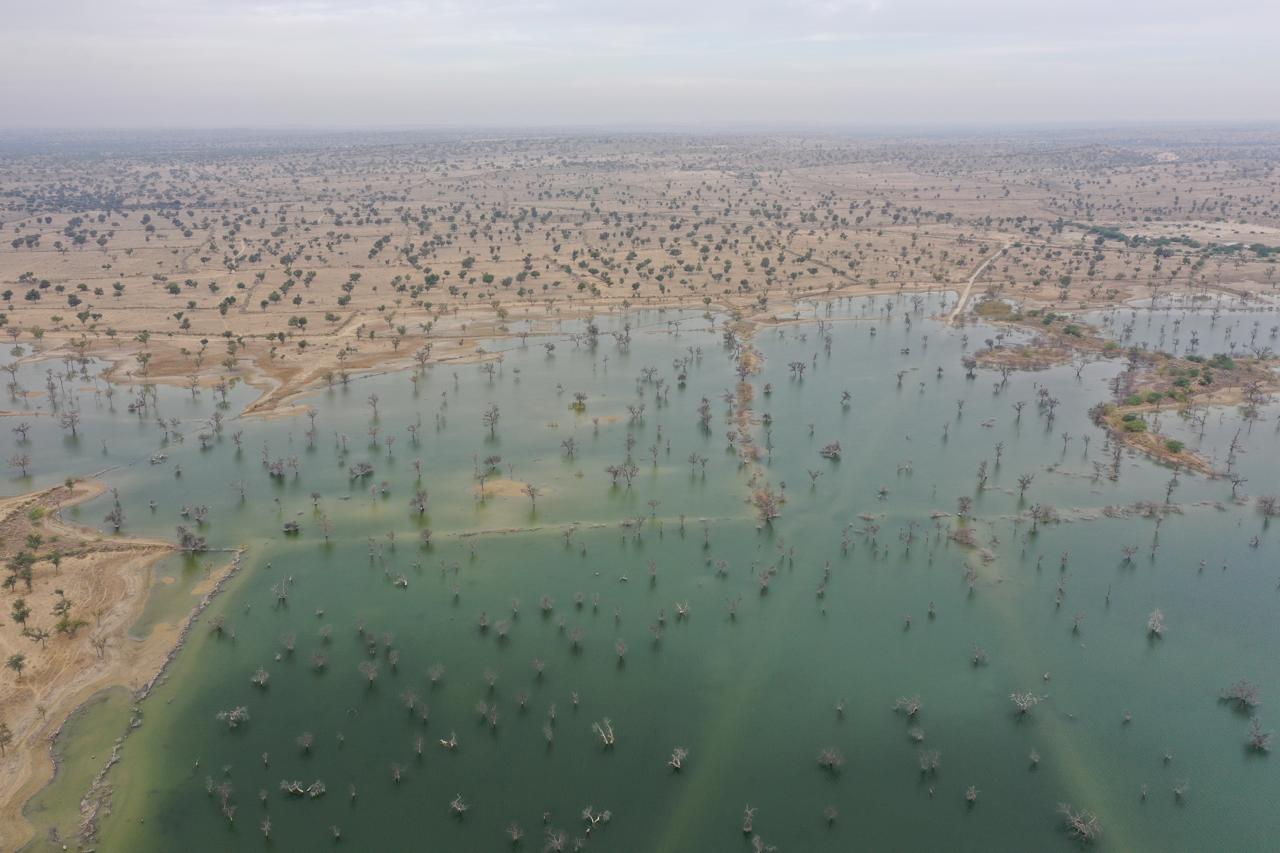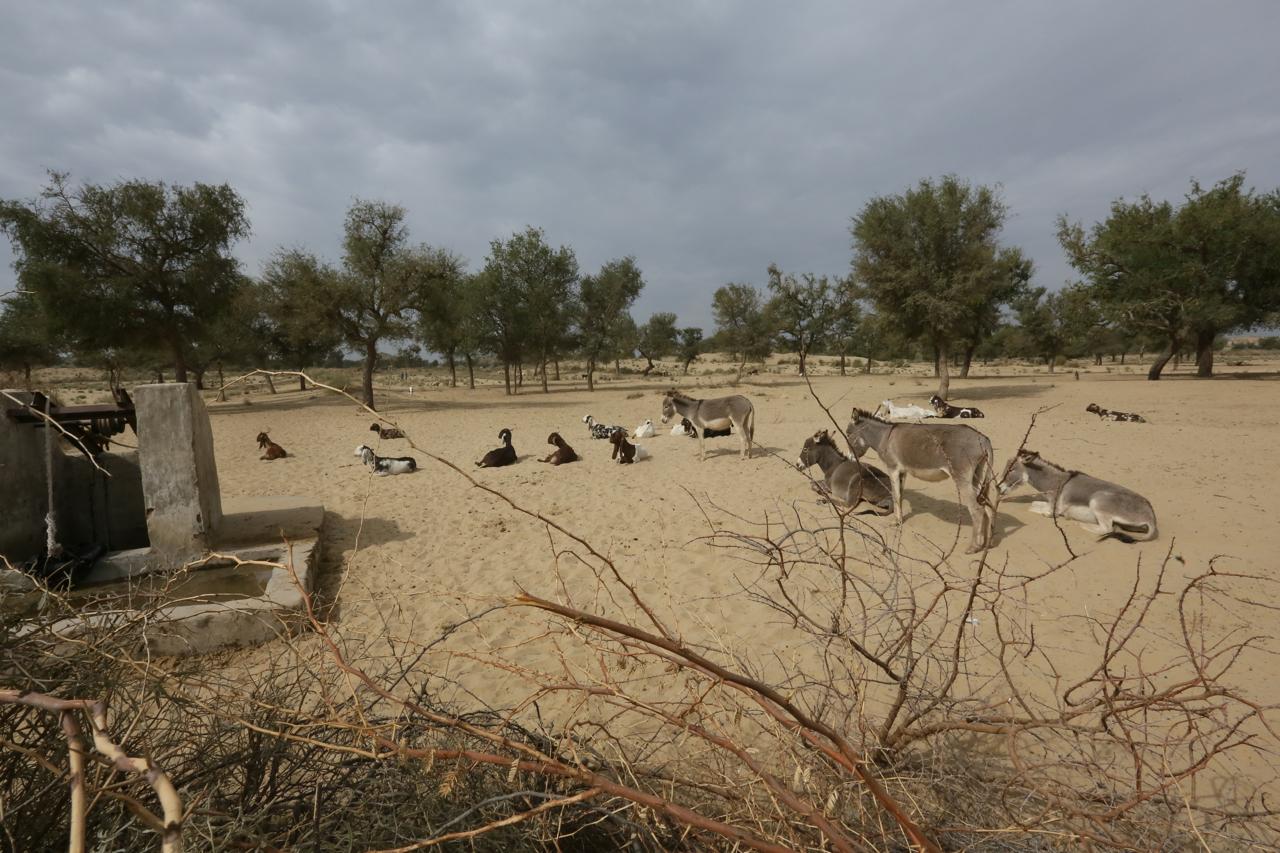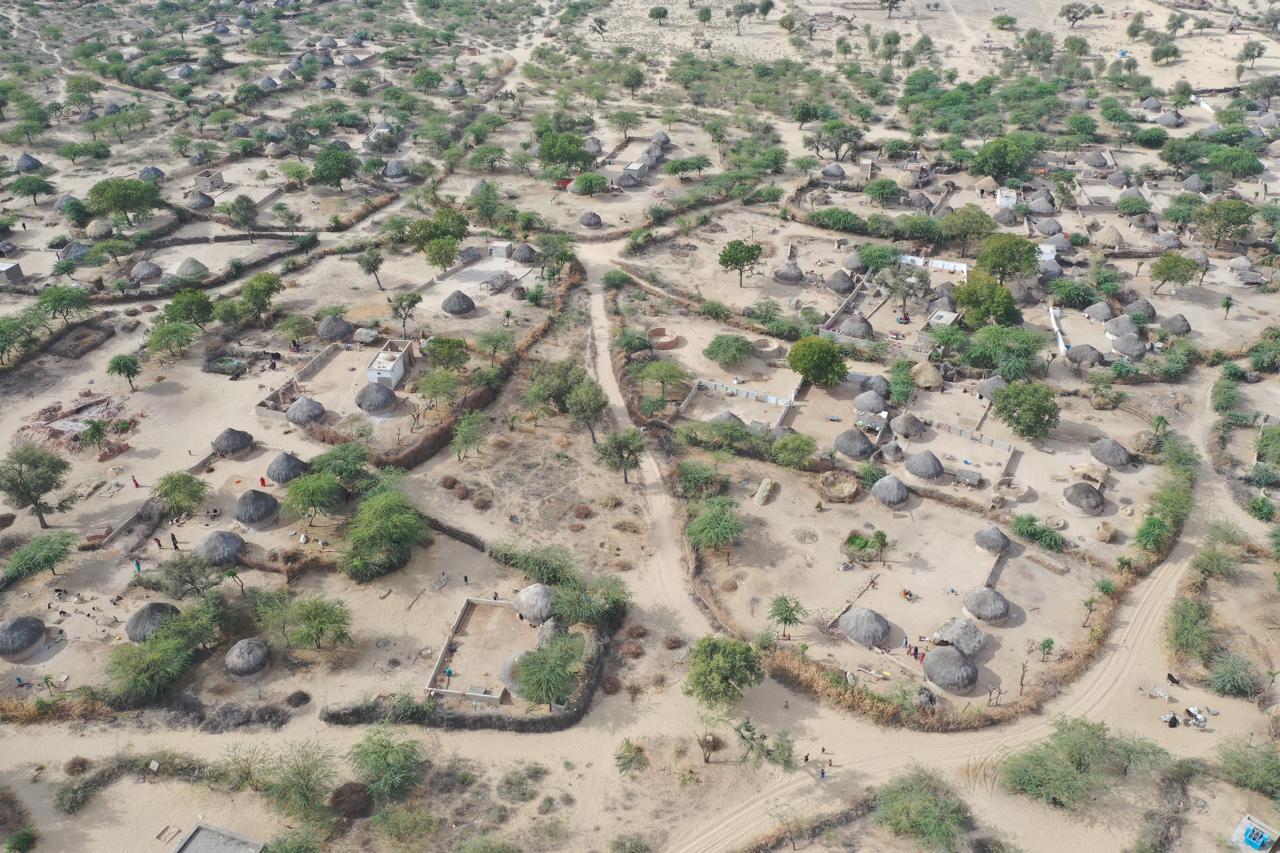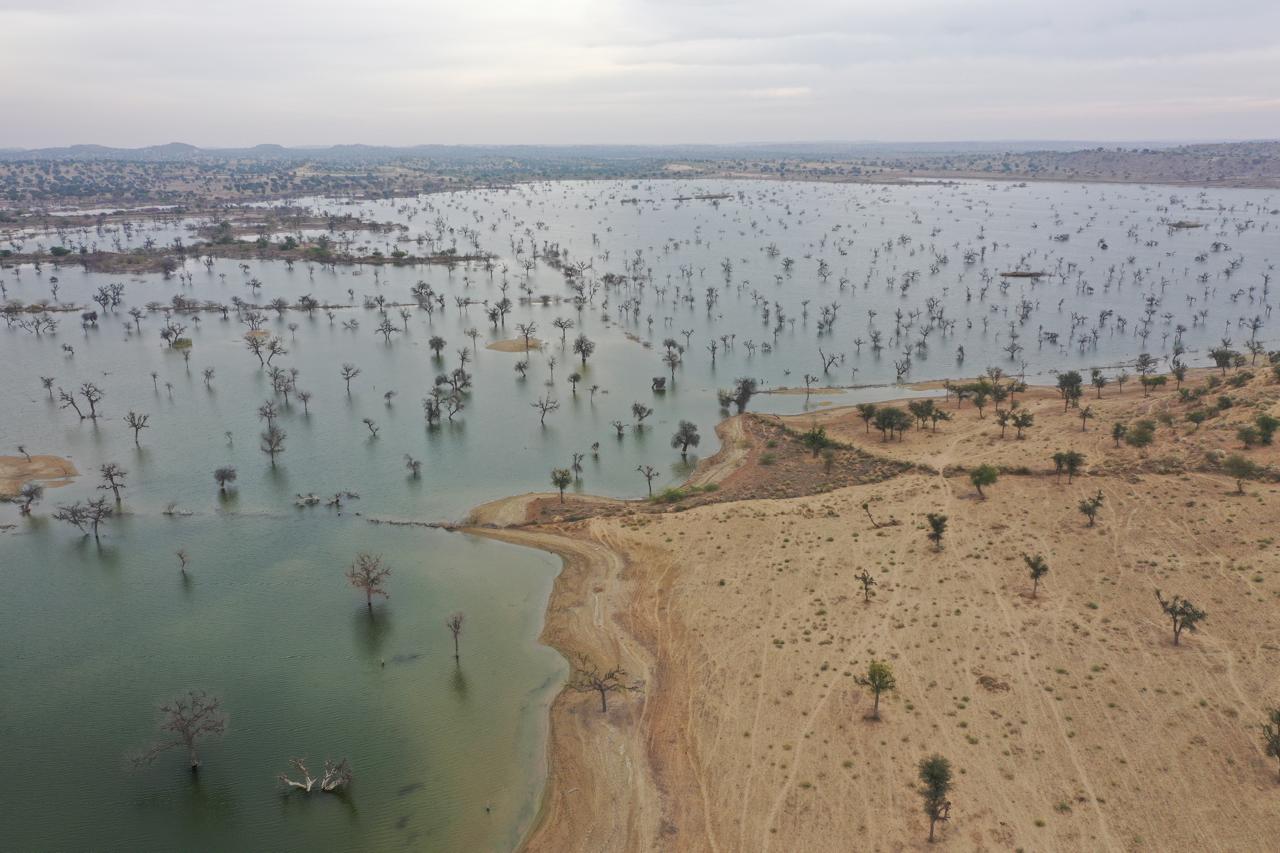Displacement Crisis in Thar’s Coal Mining Frontier
Nighat Aman
Islamabad: While the Sindh government claims that Thar coal is poised to transform Pakistan’s destiny, these efforts are simultaneously creating a displacement crisis for local residents in Thar.
The large-scale acquisition of land for coal mining has led to the displacement of many communities in the region. Their homes and lands are being excavated for mining operations, which has negatively affected their infrastructure and livelihoods.
In the Thar region of Sindh particularly, coal mining has had significant social, economic, and environmental impacts on the local population.
Local culture, traditions, and ways of life in Tharparkar are experiencing significant changes due to external interventions and new social developments.
As a result, social activists in the region are raising their concerns across various platforms.
Akash Hamirani, a social activist and educator from a village in Tharparkar, is actively raising awareness about climate change and voicing his discontent with the coal projects in the area.
He contends that these developments have been linked to a concerning rise in suicides among local residents, with reports suggesting two to three suicides per day.
According to Akash, the introduction of roads and mobile networks has heightened local aspirations, but the insufficient resources to fulfill these aspirations are contributing to the increase in suicides.
While mining projects in Tharparkar have created employment opportunities, Akash highlights that the majority of these benefits have gone to outsiders. Local residents are primarily employed in low-wage labor positions and are excluded from decision-making processes related to these projects. The displacement of homes and agricultural lands has severely impacted the economic stability of the local population.
The displacement of homes and agricultural lands has severely impacted the economic stability of the local population.
Akash challenges the media’s depiction of Thar as a place only characterized by thirst, hunger, and death. He asserts that the people of Thar are self-sufficient, environmentally conscious, and have their own distinct way of life.
Women’s Daily Struggles
Mehwish Laghari, who hails from Sindh and works in the development sector, sheds light on the adverse effects of coal mining projects on women in Thar. She reports that the dams constructed due to these projects have led to the pollution of natural underground water sources.
Women, who previously collected water from nearby wells, are now forced to travel to government-installed water plants that are often closed two days a week, leaving them with unmet water needs. This shortage also affects their livestock.
Moreover, the influx of outsiders has restricted women’s mobility, making their daily tasks more challenging and confining them to their homes. Laghari also notes that coal mining has worsened the climate in Thar, leading to an increase in respiratory diseases and other health issues among the local population.
The lack of adequate medical facilities further exacerbates these health problems, highlighting an urgent need for attention.
Displaced Thar Communities
Irshad Laghari, a journalist from Sindh, highlights that mining in the Thar Desert has severely impacted the region. Currently, there are two coal projects underway in Thar, which have led to the displacement of communities that have lived there for centuries. The government relocated these people to newly established modern villages, promising a prosperous future. However, these promises remain largely unfulfilled, causing widespread disappointment among the displaced communities.
The government relocated these people to newly established modern villages, promising a prosperous future. However, these promises remain largely unfulfilled, causing widespread disappointment among the displaced communities.
Laghari notes that while work has progressed on two blocks of the coal project, additional blocks are planned. He urges the government to reconsider such projects, taking into account the issues faced in the ongoing ones.
Fertile Sands Threatened
The Thar Desert, straddling the southeastern border of Pakistan and the northwestern border of India, covers an area of 200,000 square kilometers (77,000 square miles), making it the ninth largest desert in the world.
Tharparkar, the largest desert region in Pakistan, is home to approximately 1.5 million people. Unlike many deserts, the Thar Desert is not merely barren and dry. During the monsoon season, the golden sand dunes transform into a lush green landscape, showcasing its unique beauty.
Socioeconomically, Tharparkar is one of the most underdeveloped districts in the province, ranking 32nd nationally.
While the region is often associated with hunger, famine, malnutrition, and water scarcity, this view represents only one aspect of its reality. Tharparkar is also known for its remarkable fertility, supporting a diverse range of flora, fauna, and wildlife.
In certain areas, sweet water can be found at depths as shallow as 50 feet, while in others, it may be as deep as 300 feet.
However, there are concerns among the local population that this rich diversity may be threatened by the development of coal mining projects in the region.
Thar Land Disputes
The Land Acquisition Act of 1894, a relic of the British era, has been employed to acquire land for coal mining in Tharparkar.
This law enables the government to requisition citizens’ land but has faced criticism for failing to meet contemporary standards of public consent, fair compensation, and transparency. It has also led to concerns about forced evictions.
A report by Human Rights Watch underscores that this colonial-era legislation does not align with modern requirements or international human rights standards and calls for urgent reforms.  In Thar, problems related to transparency and fair compensation have surfaced during land acquisitions, highlighting the need for immediate and comprehensive reforms to address these issues.
In Thar, problems related to transparency and fair compensation have surfaced during land acquisitions, highlighting the need for immediate and comprehensive reforms to address these issues.
Muhammad Badar Alam, a former journalist now with the research organization PRIDE, argues that the media often reflects the interests of the government or the companies behind it.
He criticizes the media’s portrayal of Thar, claiming it inaccurately represents the Thar coal projects as a boon for national economic development, labeling this portrayal as propaganda.
Alam points out that the media fails to highlight the challenges faced by the local population due to these projects. While mainstream media is preoccupied with public relations, he acknowledges that some private media outlets are making efforts to amplify the voices of Thar’s residents.
CPEC Energy Projects
The Thar coal fields cover approximately 9,100 square kilometers and are estimated to contain over 175 billion tons of lignite, a lower-quality and more polluting type of coal. These lignite reserves are among the largest in the world.
According to Global Energy Monitor, a global organization that tracks energy projects, China has the highest number of coal power projects worldwide, following Indonesia and Bangladesh.
Many of these projects in Pakistan were developed under China’s Belt and Road Initiative and the China-Pakistan Economic Corridor (CPEC). Dr Hassan Abbas, a water expert, highlights a troubling trend: while coal projects are being phased out globally due to environmental concerns, extensive coal mining continues in our country, with severe repercussions.
Dr Hassan Abbas, a water expert, highlights a troubling trend: while coal projects are being phased out globally due to environmental concerns, extensive coal mining continues in our country, with severe repercussions.
He points to the Thar coal project, where open-pit mining is underway. This involves digging a large pit from which water is extracted and discarded, accumulating in a newly built dam.
Dr Abbas notes that this water is highly toxic, estimated to be around fifty million years old, making it unsuitable for use. The consequences are dire: soil pollution, declining groundwater levels, and detrimental effects on plant and wildlife, ultimately leading to livestock deaths.
Coal Project Controversy
Sindh claims that the coal from Thar has begun to change Pakistan’s destiny. According to the Sindh government, royalties from the Thar coal project are intended for the development of the Thar region.
Initiatives include the installation of Reverse Osmosis (RO) plants to provide clean drinking water, the supply of electricity to every village, the establishment of Mai Bakhtawar Airport in Islamkot, and the construction of a network of high-quality roads.
Additionally, the Thar Foundation has been created to support those affected by the coal projects, with a focus on employment and educational opportunities for local residents.
However, social activists in Tharparkar argue that their conditions have not improved and that they have not benefited from these developments.
They contend that the coal project has introduced significant hardships, including displacement, and demand fair compensation for their lands and solutions to their issues.
The impacts of coal mining in Thar are affecting local communities in various ways, highlighting the need for comprehensive government policies, active community involvement, and robust environmental protection measures to address these challenges effectively.
Nighat Aman is a distinguished journalist, broadcaster, and media trainer based in Islamabad. She serves as the editor at Radio News Network.

Comments are closed.